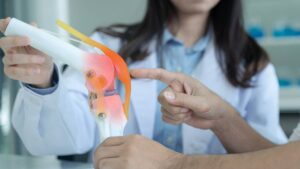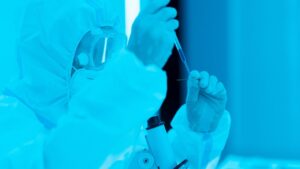Health Check: ‘Cannabis corner’ in the green with record revenues and favourable deals

Pic via Getty Images
- Bioxyne and Little Green Pharma shares surge after positive September quarter reports
- Anatara says its phase II irritable bowel syndrome trial is progressing “pleasingly”
- Percheron and Genetic Technologies to update investors on their fund raising plans
For years the out-of-favour ASX cannabis space has looked more like a case of pot luck than coherent sales strategies, but more favourable trends are emerging.
Take ‘gummie’ specialist Bioxyne (ASX:BXN), which is on track to reach its targeted annual revenue of $20 million and positive cash flow after a robust September (first) quarter.
The company this morning reported revenue of $4.6 million, 48% up on the June quarter and 119% higher year-on-year. Cash receipts were $5.8 million, with positive operating cash flow of $1.2 million.
In February this year Bioxyne was awarded Good Manufacturing Practice status for medicinal cannabis products (as well as for psychedelic mushroom-derived psilocybin, an Australian first).
The company is the only local scale manufacturer of pharmaceutical grade pastilles, a.k.a. gummies. A deal to supply a top five authorised prescriber is expected to reap at least $28 million of revenue over the next two years.
The Perth-based Little Green Pharma (ASX:LGP) has hit a purple patch, reporting record September quarter revenue of $10.2 million, 40% higher than the June quarter and 60% higher year-on-year.
Little Green reports strong demand in particular from German, British and French customers. The company makes it oils and flowers at a WA facility and also at a Danish plant, built by Canada’s Canopy Growth for C$120 million ($130 million) and acquired by Little Green for a mere $C20 million.
Meanwhile, medical and recreational cannabis player Althea Group (ASX:AGH) has sold its My Access Clinics in the UK for $1 million, to focus on non-medicinal stuff such as cannabis beverages.
Althea’s fully-owned Peak Processing Solutions makes delights such as THC-infused cola, root beer and wild berry seltzers.
The sale of My Access Clinics, to Montu UK, will shave $1.5 million in costs on top of $4 million of savings already announced.
Althea will still have a UK medicinal cannabis exposure, in that Montu has agreed to buy a minimum 10,300 units of Althea’s product over the next two years.
Bioxyne shares surged 20% to 1.2 cents, Little Green shares spurted 36% to 12 cents and Althea shares bounced 6% to 5.1 cents.
Peace erupts as Vitura settles software dispute
Medicinal cannabis buying platform Vitura Health (ASX:VIT) has settled a spat with software developer Code4Cannabis Pty Ltd (C4C) over a service agreement.
The truce involves Code4Canabis handing over a complete copy of the software, data and all related materials underlying Vitura’s Canview platform.
This means that Vitura will own and operate its own copy of the Canview platform into perpetuity and take direct ownership of managing that copy of the platform.
“Upon certification, the services agreement … which is currently due to terminate in November 2025, will terminate immediately and the fees being paid to C4C by Canview [about $100,000 per month] will cease,” Vitura says.
For its part, Vitura paying C4C $2.5 million in cash and Vitura shares currently worth $500,000.
“This is an exceptional outcome for both parties,” chirps Vitura chair Mr. Robert Lervasi.
Vitura shares gained 7% to 9.6 cents.
The word according to GARP’s backers
A quirk of Anatara Lifesciences (ASX:ANR) is that it developed a remedy for porcine scour – pig diarrhoea, a big problem in animal production – but has pivoted to more difficult human health applications.
Anatara’s main focus is irritable bowel syndrome (IBS) – a rich target in that about one in ten the populace suffers from the grumbling disorder at some time in their lives.
Anatara’s drug candidate goes by the working title of GARP, as in ‘gastrointestinal reprogramming project’.
Derived from pineapple stems, GARP is designed to restore normal microbial functions, treat inflammation and repair mucosal damage.
But a rigid clinical trial is needed.
On that note, Anatara this morning said recruitment for stage two of its local phase II trial was progressing ‘pleasingly’, with 40 patients recruited and another 20 “high potential’ candidates being screened.
On October 2 the company said it had opened additional sites in Adelaide (the South Australian Health & Medical Research Institute) and the Sunshine Coast, complementing sites at the Royal Melbourne Hospital and Drummoyne in Sydney (Oztrial).
Derived from the stems of pineapple, Antara’s enzyme extract bromelain blocks the receptor sites in the gut that the parasites attach to (thus causing diarrhoea).
While IBS is a collection of symptoms, inflammatory bowel disease is a more specific disorder causing elevated white cell counts, bleeding, fever pain and diarrhoea.
Between 30 to 50 percent of sufferers of both afflictions turn to dietary supplements or unproven complementary healthcare such as probiotics.
The company is targeting a minimum 60 participants, with a maximum limit of 100.
A read-out of topline results is expected in the March 2025 quarter.
Anatara shares lost 4% to 4.8 cents.
Percheron and Genetic Technologies investors await funding news
Further to yesterday’s snippet on rare neurological disease developer Percheron Therapeutics (ASX:PER), the company tomorrow is expected to announce that it has raised $8 million at 8 cents a share – a deep 40.7% discount.
The funds will be used partly to fund the company’s phase 2b trial of avivursen, to treat the rare childhood disorder Duchenne Muscular Dystrophy.
Meanwhile, Genetic Technologies (ASX:GTG) shares have entered a trading halt as the company assesses its “strategic options, operational review and progress on its fund raising previously announced on 26 July 2024.”
On that date, the company said it would move to a ‘capital light’ model to save costs, including outsourced its in house lab operations.
The company also launched a two-for-three rights offer to raise between $2 million and $3.85 million, but in mid-September only $324,648 had been banked.
The company expected $1 million in shortfall commitments, with the shortfall period extended in an attempt to get to the requisite $2 million.
Genetic’s main products are Genetype (for DNA disease risk) and the home- testing marketplace EasyDNA. The company reported full-year revenue of $7.66 million for the year to June 30, with a $12 million loss.
The company expects to be able to provide an update on Monday, if not before.
Genetic shares were steady at 3.9 cents.
At Stockhead we tell it like it is. While Bioxyne is a Stockhead advertiser, it did not sponsor this article.
Related Topics

UNLOCK INSIGHTS
Discover the untold stories of emerging ASX stocks.
Daily news and expert analysis, it's free to subscribe.
By proceeding, you confirm you understand that we handle personal information in accordance with our Privacy Policy.








